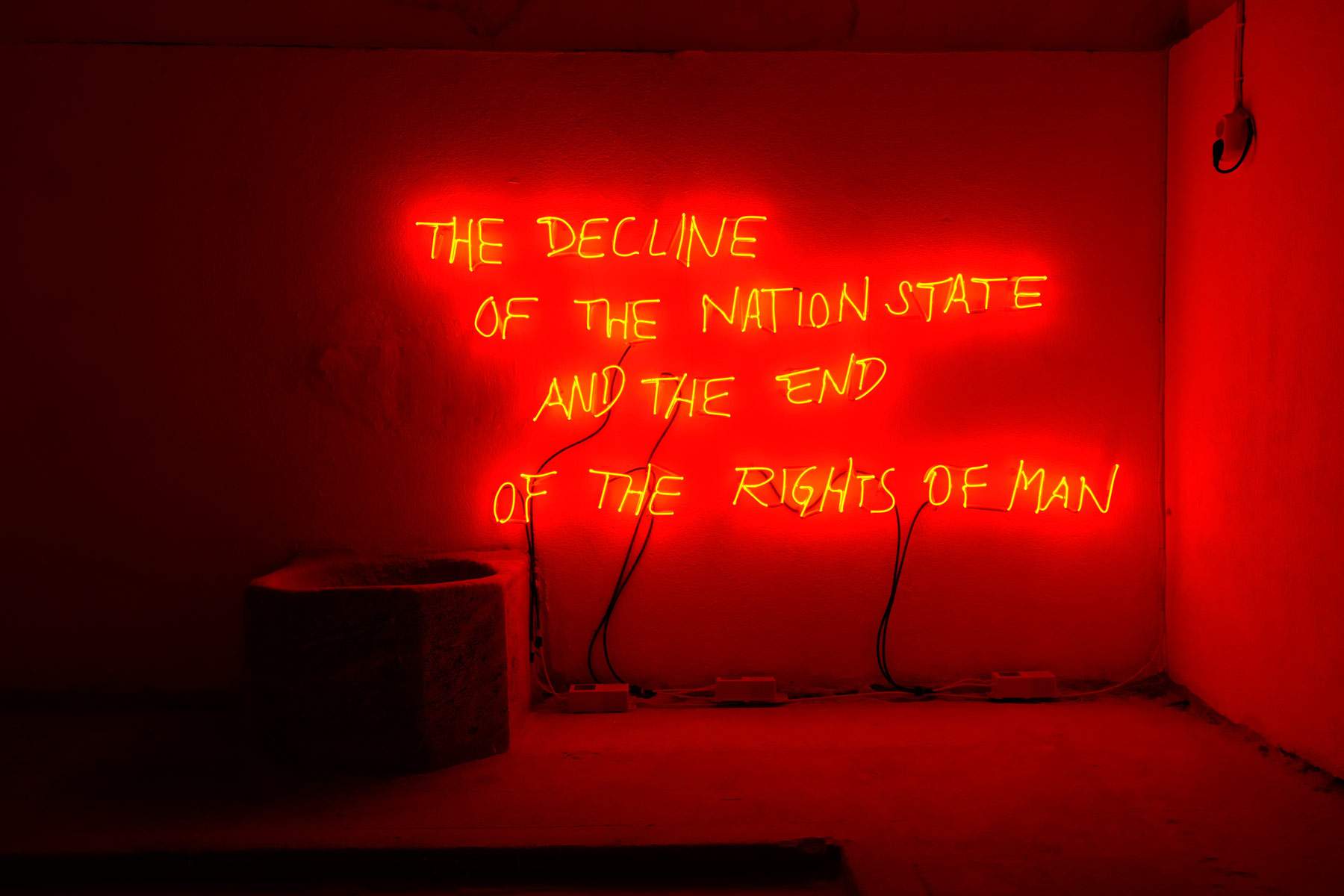It is entitled In the light of the solo exhibition of Margherita Moscardini (Donoratico, 1981) scheduled from January 21 to February 21, 2020 in Bologna, at Palazzo de’ Toschi, the headquarters of Banca di Bologna’s General Management, which once again opens its space to the work of an Italian artist. The exhibition, curated by Barbara Meneghel, interprets the venue in Piazza Galvani with a single work with a public vocation: The Decline of the Nation State and the End of the Rights of Man, a neon installation (also visible from the street given the symbolic value it intends to take on) that bears the title of the ninth chapter of The Origins of Totalitarianism text that Hannah Arendt published in 1951.
In its pages, the German philosopher describes the establishment of Europe’s nation-states through treaties that instead of legally protecting minorities condemned them, according to her interpretation, to statelessness, generating millions of refugees whom the nation-state, having failed to question its own founding principles, continues to treat today as exceptions rather than foundations. According to the exhibition project, to make these reflections of Arendt public is to introduce the viewer inside an era that has finally understood the need for a paradigm shift, allowing the philosopher (seventy years later) to respond to us on issues of stringent topicality.
Moscardini’s thesis is that we have recognized the democracies earned in the last century as an asset to be defended, but we have not been able to renew them. The perspective is that of a new way of understanding citizenship that, freed from territorial affiliation, finally overcomes the distinction between citizen’s rights and inalienable rights: if a paradigm shift were offered to us by the city, and if the city were a relevant reference capable of being the bearer of another idea of citizenship, it would be a city where it would no longer make sense to disturb institutions like asylum or insidious words like welcome and hospitality, because we would all be legally protected as foreigners. This is the thesis of Margherita Moscardini, who considers the quote in the title the statement ’in whose light’ to read her recent production, and believes this is the challenge to be taken up today.
Margherita Moscardini graduated from the Academy of Fine Arts in Bologna, and attended the CSAV of the Antonio Ratti Foundation in Como with Yona Friedman. She was a 2015 research fellow at the Italian Academy for Advanced Studies in America, Columbia University, New York, USA. Her research investigates the relationships between transformation processes of natural, urban and social order belonging to specific geographies, and her practice privileges process and long-term projects that generate large-scale interventions, drawings, writings, scale models and video-documents. In recent years, his work has been shown at MAXXI, Rome; MMCA Changdong and SongEun ArtSpace, Seoul, Korea; Collezione Maramotti, Reggio Emilia; Fondazione Pastificio Cerere, Rome; IIC in Istanbul and Brussels; MACRO, Rome; CCA, Plovdiv, Bulgaria; MAMbo, Bologna; Quadriennale and Palazzo delle Esposizioni, Rome; and Palazzo Reale, Milan. She has given lectures and conversations at MAXXI, Rome; Columbia University, New York; SVA and ISCP, New York; Triennale, Milan; NABA, Milan.
Pictured: Margherita Moscardini, The Decline of the Nation State and the End of the Rights of Man (2018). Installation view within the group exhibition “Metaphorai,” curated by K. Anguelova and A. Poggianti,CCA Ancient Bath, Plovdiv, Bulgaria (2018; red neon, 180 x 85 cm).
 |
| In the light of: Margherita Moscardini challenges the concept of citizenship with an exhibition in Bologna |
Warning: the translation into English of the original Italian article was created using automatic tools. We undertake to review all articles, but we do not guarantee the total absence of inaccuracies in the translation due to the program. You can find the original by clicking on the ITA button. If you find any mistake,please contact us.